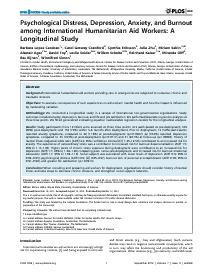Psychological distress, depression, anxiety, and burnout among international humanitarian aid workers: a longitudinal study
Background
International humanitarian aid workers providing care in emergencies are subjected to numerous chronic and traumatic stressors.
Objectives
To examine consequences of such experiences on aid workers' mental health and how the impact is influenced by moderating variables.
Methodology
We conducted a longitudinal study in a sample of international non-governmental organizations. Study outcomes included anxiety, depression, burnout, and life and job satisfaction. We performed bivariate regression analyses at three time points. We fitted generalized estimating equation multivariable regression models for the longitudinal analyses.
Results
Study participants from 19 NGOs were assessed at three time points: 212 participated at pre-deployment; 169 (80%) post-deployment; and 154 (73%) within 3–6 months after deployment. Prior to deployment, 12 (3.8%) participants reported anxiety symptoms, compared to 20 (11.8%) at post-deployment (p = 0·0027); 22 (10.4%) reported depression symptoms, compared to 33 (19.5%) at post-deployment (p = 0·0117) and 31 (20.1%) at follow-up (p = .00083). History of mental illness (adjusted odds ratio [AOR] 4.2; 95% confidence interval [CI] 1·45–12·50) contributed to an increased risk for anxiety. The experience of extraordinary stress was a contributor to increased risk for burnout depersonalization (AOR 1.5; 95% CI 1.17–1.83). Higher levels of chronic stress exposure during deployment were contributors to an increased risk for depression (AOR 1·1; 95% CI 1·02–1.20) comparing post- versus pre-deployment, and increased risk for burnout emotional exhaustion (AOR 1.1; 95% CI 1.04–1.19). Social support was associated with lower levels of depression (AOR 0·9; 95% CI 0·84–0·95), psychological distress (AOR = 0.9; [CI] 0.85–0.97), burnout lack of personal accomplishment (AOR 0·95; 95% CI 0·91–0·98), and greater life satisfaction (p = 0.0213).
Conclusions
When recruiting and preparing aid workers for deployment, organizations should consider history of mental illness and take steps to decrease chronic stressors, and strengthen social support networks.
Geachte bezoeker,
De informatie die u nu opvraagt, kan door psychotraumanet niet aan u worden getoond. Dit kan verschillende redenen hebben,
waarvan (bescherming van het) auteursrecht de meeste voorkomende is. Wanneer het mogelijk is om u door te verwijzen naar de bron
van deze informatie, dan ziet u hier onder een link naar die plek.
Als er geen link staat, kunt u contact opnemen met de bibliotheek,
die u verder op weg kan helpen.
Met vriendelijke groet,
Het psychotraumanet-team.
Referentie:
Barbara Lopes Cardozo, Carol Gotway Crawford, Cynthia Eriksson, Julia Zhu, Miriam Sabin, Alastair Ager, David Foy, Leslie Snider, Willem Scholte, Reinhard Kaiser, Miranda Olff, Bas Rijnen, Winifred Simon. | 2012
In: PLoS ONE, ISSN 1932-6203 | 7
http://journals.plos.org/plosone/article
Rubriek: Humanitarian Staff Care
In: PLoS ONE, ISSN 1932-6203 | 7
http://journals.plos.org/plosone/article
Rubriek: Humanitarian Staff Care
Trefwoorden:
Humanitarian Staff Care
Affiliatie auteur(s):


